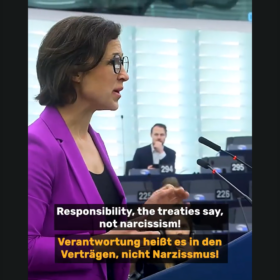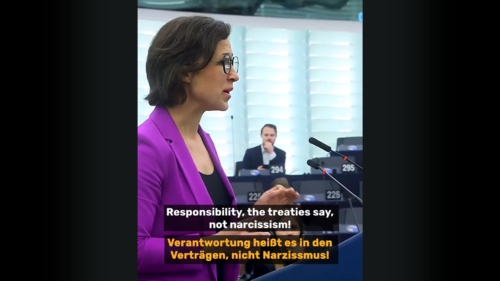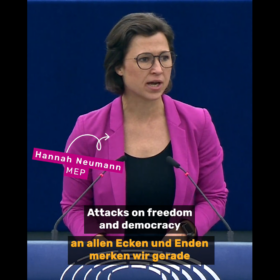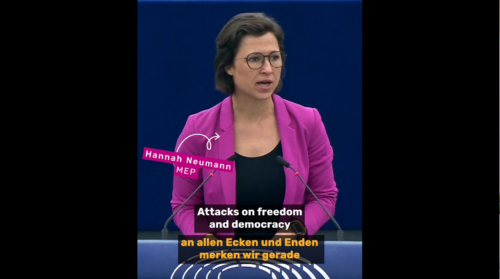In October and November, for about two weeks, I visited Baghdad, Erbil and Mosul in Iraq as well as Qamishli and Hassakeh in Northeast Syria. I met with activists, parliamentarians, ministers, military leaders and diplomats. Topics on my agenda included:
- the situation one year after the Iraqi protests and outlook to the 2021 national elections
- women and minority rights in Iraq
- the situation of ISIS fighters and family members in Iraq and Syria, including trials and de-radicalisation programmes
- the rebuilding of Mosul
- the situation one year after the Turkish invasion in North-East Syria (NES)
On this trip, I wanted find out more about the role the EU is currently playing or rather should be playing regarding these issues. This is what I learned:
On Iraq
Activists, parliamentarians and diplomats call for EU monitoring of the forthcoming parliamentary elections in 2021. Activists were disappointed at the lack of EU support of the reform movement: Despite the killing of hundreds of protesters, there was only minimal EU response (not even an EP resolution); most perpetrators were not punished.
The EU should invest more in intangible reconciliation and peace activities, including activities celebrating the cultural diversity and richness of the country. After decades of violence, reconciliation remains crucial, in particular in areas freed from ISIS rule.
On Northeast Syria:
EU and Member States have a responsibility towards key actors in the fight against ISIS terror. There is a widespread sense of betrayal that neither the EU nor the USA protested against the Turkish invasion, including against related human rights violations. The international community also has to ensure that Kurdish-dominated de-facto authorities of NE Syria are appropriately represented at peace talks.
EU and Member States have to repatriate citizens detained in NE Syria for their links with ISIS, and engage in de-radicalization efforts. Without a prospect for a fair trial in the region, human rights organizations have concluded that many persons with ISIS links who have not been charged with crimes are “arbitrarily detained” and that their situation constitutes “collective punishment”. This includes relatives of detained fighters with citizenship of an EU member state (see HRW Kanada).
EU and Member States have to step up political and financial support of humanitarian aid for Northeast Syria, where Internally Displaced Persons and the local population are in dire need of external support. This has become even more urgent since Russia and China blocked the UN from using the Syrian-Iraqi border crossing of al-Yarubiyah that allowed direct access to the territory.
1) Iraq: Back in Baghdad: protests ended - elections promised
It has been a year since I was in Baghdad the last time. Back then, I was not able to get out of the airport: Mass protests had erupted in the entire city. I would have liked to visit the Tahrir Square with its activists’ tents and its street art. But it would have been too great of a risk − hundreds of mainly young people were killed during these protests.
Now the last remnants of the protests are almost gone. This time, as we drove past Tahrir square, cleaners, by order of the city administration, were scrubbing the paintings away from the walls. The next day, the traces of the protests and their aftermath had vanished from the square: no more banners calling for democratic reforms, denouncing corruption, or showing protesters who lost their lives during the demonstrations. Meanwhile, there has been no transparent and full investigation of the lethal shootings, ill-treatment of protesters and other acts of violence carried out by security forces and militias during the demonstrations.
Some activists are still in jail, some live in hiding or in exile, while others continue. My first meeting in Baghdad was with veteran women’s rights activist Hanaa Edwar, the founder and director of the human rights organization Iraqi al-Amal. We had met before at a web-based debate on Iraq.

Hanaa Edwar had invited about twenty activists to the office of Iraqi al-Amal in the residential Karrada district. The activists were young, highly educated and working in different areas, including women’s rights, legal advice, protection of human rights defenders and medicine. Taking stock of the protests, some positive outcomes were mentioned, in particular the fact that so many people had dared to speak out on taboo issues, particularly with their protests against a corrupt political elite and Iran’s increasing influence. There was a widespread sense of solidarity among protesters, who had overcome religious and ethnic divisions for their common goal. Further, protests showed to have an impact, for example the resignation of the then prime minister, the announcement of early elections and the adoption of some − albeit limited − reforms to the electoral system.
However, overall there was a strong sense of frustration amongst the activists I met. They were disappointed because they felt that too little had changed, despite all the hardship and suffering. One main reason, according to them, was that protesters had been outspoken about what they refused, but were unable to come up with alternatives on how to handle the situation. Therefore, the activists were concerned that even members of the parliament yet to be elected in 2021 will hardly listen to the voices of protesters. Whilst some activists have already joined existing parties, many others will continue to act as extra-parliamentary opposition.

This is due to two reasons: Firstly, activists lack resources to establish their own political party and secondly, there are many who have reservations to become part of a political system that they still describe as corrupt, militarised and elitist, with little signs of change present. Further, despite some electoral reforms, the constituencies remain small and subject to ethnical gerrymandering, making it difficult for new parties and candidates to succeed.
Some activists had announced intentions to run as independent candidates, but had been targeted by threats, violence, and arson attacks. Another issue is that armed groups and militias may prevent many people from going to the polls. Hoping for a better future for their country, the activists expressed their strong wish for international election observers, in particular by the EU. Similarly, during meetings with the parliamentarians and diplomats during the following days, the call for an EU election-monitoring mission was reiterated (See also
Another key topic during my meetings in Baghdad was women’s rights and women’s role in society. Activists pointed out to the important role of women during the protests: Many of them were very visible and outspoken. However, despite a 25% quota for women in parliament, expectations for advancements of women’s rights remain low. One of the reasons is that a substantial number of women elected via lists of established political parties are no advocates of women’s rights. They rather want to preserve traditional and conservative gender roles. Women who want to advance women’s rights have often been cautious to run for elections, for good reasons. They are at risk of becoming a subject of smear campaigns and verbal and physical attacks − against themselves, but also against their entire extended family.
There are women parliamentarians who can serve as role models. For example, women’s rights advocate Ala Talabani, who was forced into exile in the 80s for refusing to join the Baath party under Saddam Hussein’s rule. Since his overthrow, she was elected several times into parliament on the list of Patriotic Union of Kurdistan (PUK), one of the two main Kurdish parties. Having been the first woman leader of the PUK faction in parliament, she did not shy away from criticizing the male-dominated Kurdish leadership. Like other Iraqi women’s rights advocates, Ala Talabani pointed to some progress Iraqi women have achieved, in particular legal changes to counter domestic violence and the establishment of preventive measures, including shelters. However, she believes that women politicians remain too much focused on “soft” policy areas related to family and social issues.


On my third day in Baghdad, I met MPs at the National Assembly, located in the previously protected Green Zone established by the US. This gathering, arranged via the Iraqi embassy in Brussels and hosted by MP Yonadam Kanna, included a range of politicians representing the ethnic and religious richness of Iraq, including Sunni, Shia, Christians, Yazidis and Turkmen. The fragmented political landscape of the country has made it increasingly difficult to form government coalitions. In May, the new Iraqi Prime Minister, Mustafa al-Kadhimi, formed a “cabinet of compromise” involving all major political parties. But this government only operates as a makeshift solution. In our meetings, MPs from different political camps expressed support for protesters’ calls for reforms of the current political system, which reinforces existing divisions in society. They echoed calls of activists asking for a close monitoring of the election by international observers.
There is wide consensus that Iraq would benefit from international support for the forthcoming elections. In addition to activists and parliamentarians, also diplomats emphasized that a long-term EU election-monitoring mission would be welcome. The need for monitoring of social media during the campaign period was mentioned in particular, given that they have been used to incite violence and hate, as well as for smear campaigns. It was also pointed out that awareness raising to increase participation in elections was required ─ given that in the last national elections of 2018, turn-out was only at 45%.
MPs representing religious and/or ethnic groups gave me updates about the situation of minorities, in particular in the North. Religious minority communities, especially Yazidi and Christians, have suffered most under ISIS terror, and their numbers are dwindling. Already before ISIS existed, there had been calls to establish an autonomous zone in the governorate of Mosul (Nineveh) as a safe haven for minorities. However, this never materialized and appears unlikely now: The key challenge is to enable the safe return of Internally Displaced Persons belonging to minority groups to their homes, which they were forced to leave behind due to the Islamic State.
In October, Iraq’s federal government and the Kurdistan Regional Government (KRG) reached the so-called “Sinjar Agreement” paving the way for safety and reconstruction in the Sinjar district. The UN-facilitated agreement is seen as a crucial step for the return of IDPs,the majority being Yazidi survivors of ISIS terror. However, the agreement also sparked criticism from some Yazidi groups for not having been included in the decision-making process.
2) Iraq: Reviving the Spirit of Mosul


Mosul is a symbol. It was a cultural hub where different religious and ethnic groups lived peacefully together. In the early years of this century, it became a hotspot for Islamic extremists, including al-Qaida, which laid the ground for ISIS taking control of the city in 2014. Mosul was freed from ISIS terror in July 2017, leaving most of the old city destroyed.
Despite all the destruction, there is hope. International donors, including the EU, the UAE, Germany and Japan, are investing heavily to rebuild the most prominent sites of the old city, including mosques, churches and palatial houses. The EU’s contribution to the UNESCO Programme “Revive the Spirit of Mosul” amounts to 20 million Euros. The aim of the programme is to support social cohesion and reconciliation through the restauration and reconstruction of the historic Old City. The programme offers young people jobs and the opportunity to learn new skills.

UNESCO invited me for a visit of Mosul, where I was able to witness the substantial progress of their work, also compared to the situation I was confronted with when I last visited Mosul in 2019. So far, the main challenges have been to clean the historic sites of debris whilst ensuring their protection, and the stabilization and preservation of remaining artefacts, which is necessary to start the reconstruction process. To achieve this, training local craftsmen (and craftswomen!) and artisans in old crafting techniques and skills will become crucial. Whilst the pace of reconstruction work has been slowed down by some administrative hurdles and the Covid-19, UNESCO is confident that success will soon also become more visible in the city. Besides the reconstruction of buildings, UNESCO puts high importance on efforts to rebuild intangible culture, providing support to activities ranging from music concerts to a book market. UNESCO representatives pointed out that some of the reconstructed buildings could be used for cultural purposes, for example as a music school.
Several days later, I returned to Mosul, this time to meet with cultural activists. Before my visit, I had been in touch with “Act4hope”, a Beirut-based NGO using artistic projects to work for peace and reconciliation, including by bringing to public attention the diversity of musical practice of Mosul. Through their contacts, I was able to meet inspiring and creative activists belonging to Mosul’s art scene, who work in music, literature and filmmaking. They expressed a strong wish to demonstrate to national and international audiences that cultural life is blossoming again in their city. However, it is also true that many artists have not yet returned to Mosul, still living in other parts of the country or in exile. It is also true that the cultural landscape is still male-dominated, but there have been some workshops aimed at women artists showing good results.
Activists in Mosul would like to initiate a wide range of cultural events in the context of reconciliation work, including a music festival, a film festival or a book fair. So far, the EU has not been very visible in “cultural reconciliation activities” in Iraq. However, EU representatives as well as representatives of cultural institutions of member states, like the Goethe Institute Liaison Office Erbil, assured me that there is lots of interest and readiness to support such initiatives.
Goethe Institute Erbil, as well as the French cultural institute support a number of local cultural initiatives. I met with representatives of a few of them during a visit of a traditional tea house in Erbil. They shared how, from their point of view, they see culture can support reconciliation They very much appreciate the financial support they receive, as well as the constructive exchange taking place between the Goethe Institute and their initiatives. As discussed in the Aachen Treaty, the two cultural institutes hope to build a joint representation in Erbil, hopefully with a location on the slowly reconstructed Erbil Citadel, which is in the process of reconstruction. An initiative that is very worthy our support.

3) Northeast Syria: Travelling into unrecognized territory

In Erbil, I met with representatives of the Kurdish Regional Government (KRG). We talked about how to move forward with the investigation and prosecution of certain human rights violations, in particular the crimes of ISIS. The Kurdish Department of Foreign Relations also facilitated contact with their counterparts in the Autonomous Administration of Northeast Syria (AANES). Thanks to this, I was able to cross into Syrian territory, bypassing the central government in Damascus. From Erbil, it was a four-hour car trip to the Iraqi border crossing of Fish Khabour, where I was shuttled via a floating bridge across the Tigris to the Syrian shore.
For three days, I was hosted by representatives of the “Autonomous Administration of North and East Syria” (AANES), since 2012 in charge of the self-governed region also referred to as “Rojava”. The region and its official military force, the Syrian Democratic Front (SDF), is multi-ethnic, including Kurds, Arabs, Assyrians, Turkmen, Armenians and Circassians. Kurds are clearly dominating the political administration and military forces, but other ethnic groups are also represented.
Promoting tolerance and the richness of multi-ethnicity is also a key objective of ARTA FM Radio Station who had invited me for a visit. The station has received EU funding in the past. Their radio programme is aired in many refugee camps and an important source of information. Especially in times of escalating conflict as well as the spread of Covid, even the poorest can receive it. During the exchange with journalists, questions about freedom of expression were also raised, as it is clear that media in AANES have to operate with certain boundaries.
You are currently viewing a placeholder content from Facebook. To access the actual content, click the button below. Please note that doing so will share data with third-party providers.
More InformationLeadership positions in the region are co-chaired by women and men. The Kurdish main armed forces in the region, the YPG (People’s Protection Units), also have a women-only wing, the YPJ (Women’s Protection Units). I had several conversations with YPG and YPJ leadership, including its spokesperson Nesrin Abdallah on the situation in the prisons and camps of ISIS fighters and families. During my visit at the Al-Hol Camp for relatives of suspected ISIS fighters, I was taken around by women guards of the YPJ in charge of security. Soon after my arrival, I was welcomed by Abdelkarim Omar, Co-Chair of the External Relation Department of AANES. In our meeting and in the subsequent meeting with AANES politicians, we addressed key concerns in the region, including:
- Turkey’s incursion into previously AANES-controlled territory, and related human rights violations
- exclusion of dominant forces in the AANES from UN-facilitated peace talks due to a lack international support
- dependence of the local population and of Internally Displaced People on humanitarian aid, which is hampered by the closure of a border crossing for UN humanitarian aid, imposed by Russia and China
- burden sharing regarding detained ISIS fighters and their relatives in camps, in particular those with citizenship in EU Member State


On Turkey’s incursion: The international coalition has closely cooperated with the SDF in the fight against ISIS, but has not taken action to prevent the Turkish incursion along the Northern border. The presence of Turkish troops and related ongoing human rights violations are a key concern for people in the region. Therefore, AANES and local NGOs advocate for an EU arms embargo against Turkey and accountability for violations. Further, I was informed that in cases of members of SDF troops injured in the fight against ISIS, visa applications for urgent medical treatment in EU member states were generally turned down.
UN Syria peace talks: The AANES is not officially recognized as autonomous region by the Syrian government or any international state or organization, but it entertains some foreign relations. The dominant political group in the region’s armed forces and political administration, the Party of the Democratic Union (PYD), remains excluded from the UN-sponsored peace talks, largely because the Syrian government and opposition groups object their allegedly separatist agenda. Instead, only representatives of the Kurdish National Council (KNC) have access to the peace talks. Whilst the KNC is affiliated with the ruling party of the Autonomous Region of Iraqi Kurdistan and has established relations with Turkey, Turkey is fighting the PYD due to its links with the PKK (Kurdistan Workers’ Party) whose leader is serving a life sentence in Turkey.
Since last year, the US has been active to ease tensions between stakeholders in northeast Syria, including Kurdish-Arab and intra-Kurdish relations. However, Turkey remains at unease with US-backed peace talks between Syrian Kurdish rival groups.
On humanitarian aid: About three million people live under AANES control, with the majority in great need of humanitarian help − especially the estimated 700,000 Internally Displaced Persons, including Kurds expelled from Afrin, Tal Abyad, and Ras al-Ain during the Turkish offensives (population numbers). In the year 2020, the EU has provided humanitarian aid worth 38 million Euros. However, delivery of humanitarian aid is seriously obstructed since Russia and China are objecting to the use of the al-Yarubiyah border crossing between Northeast Syria and Iraq. Consequently, aid can now only come through territory controlled by the Syrian regime.
On suspected ISIS fighters and their relatives:
The AANES is in charge of an estimated 5.000 detained suspected ISIS fighters and about 65.000 women and children with ISIS links. They include 13,500 “foreign” women and children (i.e. non-Syrians or Iraqis) held mainly in the camps of al-Hol and al-Roj. More than 1000 male and female foreign fighters from EU Member States are detained in makeshift prisons.
During my stay, I visited the al-Hol Camp, one of the locations in Syria where relatives of suspected ISIS fighters are held − all women, or children. According to the guards, about 7000 children and 2000 women are held in the “foreigners” section of al-Hol Camp. The guards confirmed reports about fights between women in the camp, in particular incidents where radical women were attacking others, in some cases leading to deaths. The guards admitted that they were not able to control the safety inside of the camps. The camp population is largely in charge of internal processes, including food distribution and schooling of children. There are shortages of food and of warm winter clothes. Sanitary conditions are basic.
Substantial numbers of Syrian women and children with ISIS links have been released in recent months. “Foreign” women and children could not benefit from these amnesties, as this would require repatriation to their home countries. Human rights organizations have questioned the legality of the ongoing detention of women and children with ISIS links in al-Hol and other locations, calling on AANES to: “Release all detainees who are not charged with a prosecutable offense or those whose detention has not been approved by a court” (See HRW, 29 June 2020: “Bring me back to Canada“).
In addition to arranging the repatriation of EU citizens with ISIS links, EU member states should also engage more in de-radicalization programmes in the camps regardless of the recipients’ nationality. Such a commitment should be complimentary to initiatives funded by the EU Instrument contributing to Stability and Peace (IcSP), including a de-radicalisation programme for children and wives of ISIS fighters in al-Hol camp.
A substantial number of Syrians has already been tried before AANES courts. However, the situation of suspected “foreign” ISIS fighters remains complicated. AANES has offered to hold trials of “foreigners” in its territory with international assistance. European countries are unlikely to support such a setting, as it would involve implicit recognition of AANES. There have also been suggestions to hold trials of foreign ISIS suspects in Iraq, including under supervision of the United Nations Investigative Team for Accountability of Da’esh/ISIL (UNITAD). But it appears that neither Iraqi authorities nor UNITAD are supportive of such a scenario.
Therefore, the only viable option for citizens of EU Member States held in Syria as ISIS suspects, as well as their relatives, is their repatriation to EU member states. Here, they can be brought to justice in fair trials according to international standards, and be monitored after their release − according to the law. Former fighters and their relatives should be encouraged to take part in de-radicalization programmes. With the repatriation of 110 citizens, including men, women and children, Kosovo can serve as an examplethat other European countries can learn from.
Given the brutal crimes ISIS has been responsible for, reluctance to repatriate ISIS fighters and their partners is understandable. However, the EU and its Member States cannot just wait and try to sit out the problem. Already in September 2019, the UN Special Rapporteur on the Promotion and Protection of Human Rights while Countering Terrorism:
The urgent return and repatriation of foreign fighters and their families from conflict zones is the only international law-compliant response to the increasingly complex and precarious human rights, humanitarian and security situation faced by those women, men and children who are detained in inhumane conditions in overcrowded camps, prisons, or elsewhere in northern Syrian Arab Republic and Iraq.
UN Special Rapporteur on the Promotion and Protection of Human Rights while Countering Terrorism Tweet
Final remarks
During my two-week trip to Iraq and Northeast Syria, I met wonderful people. Obviously, we talked mainly about politics − but not only! Not all of my encounters have been reflected in this mission report, but all of them have been incredible valuable for me. I would like to thank everyone for their thoughts and support!

















